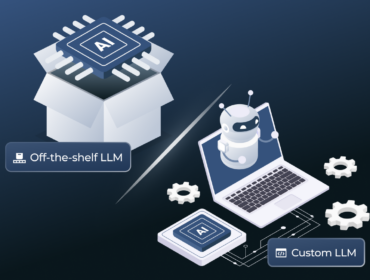While blockchain focuses on providing a high level of security, the apps that operate on a blockchain are often vulnerable to external threats.
Since blockchain apps use smart contracts to interact with the blockchain, it is important to audit them and identify any potential risks. Continue reading for a brief introduction to smart contract auditing, the resources you need to conduct it, and the stages of the process.
What is a Smart Contract?
A smart contract is a digital protocol that enables transactions and controls their execution using mathematical algorithms.
Smart contracts are stored on a blockchain platform. When concluding a smart contract, the parties involved prescribe in it the terms of the transaction, sanctions for non-compliance, and place their digital signatures. A smart contract independently determines whether the conditions are met and makes the final decision: to complete the transaction, impose a fine on the participants, or even close access to assets.
Despite the obvious convenience of smart contracts, they come with their own vulnerabilities. For example, smart contracts used in the Ethereum blockchain are prone to:
- Possible errors when programming in the Solidity language, for which all smart contracts are created.
- Disruptions of EVM work, as well as the inability to correct errors in the created contract.
- Errors within the blockchain are associated with a delay when checking the status of a contract (in such cases, one of the parties considers the contract to be completed, although this has not yet happened).
In recent years, several DeFi projects suffered significant setbacks because of smart contracts vulnerabilities:
- Lendf.me – $25 million loss
- bZx – $645,000 loss
- Parity – The DAO – $55 million loss.
To ensure there are no security issues present and that a smart contract will perform as it is intended, it is highly recommended to conduct a smart code audit.
What is a Smart Contract Security Audit
The purpose of a smart contract audit is a thorough analysis of the code in order to identify any weaknesses and vulnerabilities. Smart code audit is conducted using a combination of manual and automated tools along with methods intended to identify and model the exploitation of vulnerabilities in their target environment.
Smart code audit before deploying a smart contract is critical as, once you write it, it can’t be changed. Without a proper audit, smart contracts expose you to risks such as personal data loss and data theft.
The main reasons for conducting a smart contract security audit are the following:
- Achieving better code optimization
- Improving performance
- Increasing wallet security
- Protection against hacking attacks
Smart contracts auditing is useful for:
- Owners of decentralized applications products
- Individuals looking to build trust with investors, stakeholders, participants, and others.
- Creators and organizers of ICO startups
- Developers
Smart Contract Audit Process
The basic structure of a smart code audit commences with a specification agreement, followed by a testing process, additional manual and automatic reviews, and concludes with a final audit report.
Specification agreement
The first stage involves composing a smart contracts specification agreement. Such documentation should provide a clear explanation of the project’s architecture, process, and design options. The specification is usually documented in the project’s README file.
Lack of documentation makes it impossible for auditors to understand the desired and actual operation of the code for the contract.
Testing
The testing process is a critical step in the smart code audit. During this process, auditors will search for bugs and vulnerabilities. There are several options for conducting tests. These include unit tests for individual features, integration tests that focus on problems in larger code, and many others.
The testing process helps to easily identify and correct bugs before it’s too late. The tests also help to ensure that developers confirm the working operations of certain features and the project’s overall performance.
Automatic analysis
The second stage relates to analyzing the audit. An automatic analysis allows for easier detection of errors, making the process faster and more straightforward. However, note that automated analysis tools for Solidity are only in their early stages of development. That’s why it may take time to achieve auditing excellence.
Manual analysis
Despite the fact that automated analysis delivers obvious benefits in terms of a streamlined process, an analysis carried out manually adds an important component. With it, the intentions of the developers working on the project are made clear. Auditors can evaluate any specification to confirm that a project has been executed according to its intended functionality. Based on these improvements, credible recommendations can then be offered to the project team.
Audit report
This is the last step in conducting a smart code audit. At this stage, auditors provide a detailed report on the tests completed, along with the results of their automated and manual reviews. Afterwards, the audit team should discuss the findings with the project team to understand smart contract vulnerabilities.
In a Nutshell
A Smart Contracts Audit is an important step in leveraging blockchain technology. With it, you can improve the functionality and performance of blockchain applications while ensuring the security of sensitive data.
If you are looking for a way to ensure the integrity of your smart contract functionality, Unicsoft is here to provide you with a professional consultation. We leverage our blockchain and smart contract development expertise to help you reassess your smart contracts and eliminate errors.





![Smart Contract Security Audit: Definition, Process & Use Cases What’s the EU Artificial Intelligence Act and How to Comply? [Webinar]](https://unicsoft.com/wp-content/uploads/2024/03/Cover_1140_v1.1-370x280.png)

